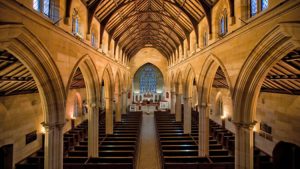Home » Commentary » Opinion » Anglican bans align with beliefs
· Ideas@TheCentre
 The Sydney Anglican Diocese has provoked controversy by proposing a policy to ensure that all church property is used in ways consistent with Anglican church teaching.
The Sydney Anglican Diocese has provoked controversy by proposing a policy to ensure that all church property is used in ways consistent with Anglican church teaching.
The proposal vetoed activities such as same-sex marriage receptions, meditative yoga, and indigenous smoking ceremonies, and was intended to extend to some 900 church properties. Parts of the policy — those concerned with smoking ceremonies — were withdrawn following protests from indigenous leaders and school principals. But many were still angry at what the church had proposed.
Religious doctrines often seem bizarre to those who do not belong to the faith community. It can be hard, for example, to see what problem believers have with yoga or hosting wedding receptions.
The Sydney Anglican policy emerged from specific Christian beliefs about salvation, the human person, human sexuality, and freedom. To those who share these beliefs, the policy might well make sense. To those who don’t, the whole exercise can — and did — seem bizarre, and simply another example of the irrelevance of religion to mainstream everyday Australian life.
After a fortnight when religious schools have been accused of wanting to expel gay students and church landlords accused of wanting to do the same to gay tenants, religious freedom is still a hot topic. And the reason is that one of the features of being a citizen in an open and free society is having to figure out how to live with those whose worldviews and beliefs are far removed from our own.
Even if we think they are wrong and that their practices are offensive, we must be sure to allow religious people and communities the freedom to interpret the world and the universe as they see fit. And we must also afford them the freedom to order their affairs — including their property use — in ways that align with those beliefs, as long as they do nothing illegal or harmful to others.
Of course, if we don’t like it — and often there is a lot not to like — we are free to criticise it because we live in a society that tolerates freedom of speech and the frank exchange of opinions. But criticising a church for attempting to implement a policy that could have a substantial impact on non-church people is one thing; it is quite another to tell it how to deal with its own property.
Anglican bans align with beliefs